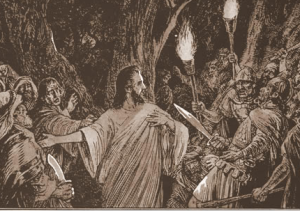Here is a blazing example of what happens when Christians pay little attention to context in the Bible. I have seen several forum discussions in the last months where Christians said, ‘…but Jesus told his disciples to buy swords.”
On the Way to the Mt. Of Olives
Luke 22
35 And he said to them, “When I sent you out with no moneybag or knapsack or sandals, did you lack anything?” They said, “Nothing.” 36 He said to them, “But now let the one who has a moneybag take it, and likewise a knapsack. And let the one who has no sword sell his cloak and buy one. 37 For I tell you that this Scripture must be fulfilled in me: ‘And he was numbered with the transgressors.’ For what is written about me has its fulfillment.” 38 And they said, “Look, Lord, here are two swords.” And he said to them, “It is enough” [ESV].
First, we might note the hyperbole of selling an essential garment in order to buy a sword. What is being emphasized is the critical situation that is developing.
The context of this setting is immediately before they go to the Mount of Olives where Jesus will be arrested and where Peter will use one of those swords (John 18). “Then Jesus said to him, “Put your sword back into its place. For all who take the sword will perish by the sword” (Matt. 26).
But back to the immediate context of the “swords”—there are clear clues in this hard saying for us to follow. We are told that the disciples possess “two.” Jesus reply, “It is enough,” can only mean either 1) that two swords are sufficient to fill the prescription [that the Scripture about being “numbered with the transgressors” must be fulfilled](Marshall thinks this not “probable”) or 2) that “enough” is a rebuke to the disciples for not understanding him.
“The words, ‘It is enough’, may imply that that is enough of that kind of talk”–The New International Dictionary of New Testament Theology
Norval Geldenhuys, Luke (NICNT) thinks that, rather than a rebuke, this “ends the discussion sorrowfully.”
I. Howard Marshall, in Luke (NIGTC), says, “It is most probable that this simply means ‘That’s enough (sc. of this conversation) and is meant as a rebuke….This is the final conversation-piece in the extended dialogue…It brings to a climax the misunderstanding and earthly-mindedness of the disciples [how contemporary for us disciples today!] which has already figured three times in the dialogue…the disciples fail to understand; taking Jesus literally, they produce two swords, and Jesus has to rebuke them for their lack of comprehension…” **
[It is incredible that many Americans who claim the name “Christian” use this saying to justify their own beliefs about war. On this side of the Resurrection, the gift of the Holy Spirit, and the Canon, we are without excuse for such nonsense.]
**[A note on “enough” from another scholar: ‘Jesus words, “It is enough” are interesting. This is an idiom, and as an idiom is difficult to trace throughout the Bible, but a few references are illuminating. In Deuteronomy 3:26 the NIV (among other translations) render God’s rebuke to Moses as, “That is enough.” In other words, “Be quiet – the discussion is over.” In 1 Samuel 15:16, Samuel cuts King Saul’s excuse off with a brisk, “Stop!” In 2 Samuel 24:16, God stays the hand of the destroying angel with an emphatic, “Enough!” Interjections such as these have both a disjunctive and a corrective sense. They are used to stop the present flow of words or actions, and they indicate a different path of action or discourse will follow. Viewed in this manner, Jesus is simply telling his disciples to shut up; they have utterly misunderstood him yet again,. . .’]
[Link on Romans ’13’]

